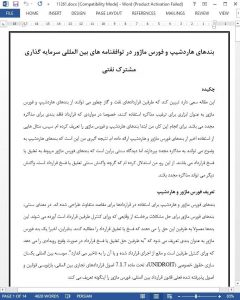Abstract
This piece tries to establish how parties to oil and gas agreements may rely on Hardship and Force Majeure clauses as means of encouraging renegotiation, particularly in cases lacking a contractual term providing for renegotiation. In doing so, I first give a definition of Hardship and Force Majeure clauses. I, then, provide examples form recent practice of both Hardship and Force Majeure clauses. I conclude that Hardship clauses clearly can deal with renegotiation but the traditional view is that Force Majeure clauses deal with suspension or termination of the contracts. I, hence, argued that although the traditional response was suspension or termination of contract, another possible response is renegotiation.
Defining Force Majeure and Hardship
Force Majeure and Hardship clauses are meant to be used in contracts for different purposes. In a traditional sense, Force Majeure clauses exist to solve the problems arising from events that are beyond the control of the parties to the agreement. They tend to give the party the right to request the termination or suspension of the agreement.1 A Force Majeure clause has recently, therefore, been defined as clause which “entitles a party to suspend or terminate the contract on the occurrence of an event which is beyond the control of the parties and which prevents, impedes, or delays the performance of the contract.”2 The International Institute for the Unification of Private Law (UNIDROIT)3 , under Article 7.1.7 of the Principles of International Commercial Contracts, a restatement of the currently accepted rules and principles of international contract law, defines Force Majeure as follows.
Conclusion T
he recognition of changes in circumstances concept does not mean that parties are entitled to adjust a contract by means of renegotiation. It means that parties to oil and gas agreements, even when great attention is paid to choosing a well-defined legal framework which recognises the changes in circumstances concept, should not expect their contractual terms to be easily adjusted. This led me to pick other means on which parties to oil and gas agreement may rely to encourage renegotiation, such as Hardship and Force Majeure clauses. Based on the literature, Hardship clauses clearly can deal with renegotiation but the traditional view is that Force Majeure clauses deal with suspension or termination of the contracts. I, however, argued that although the traditional response was suspension or termination of contract, another possible response is renegotiation.








